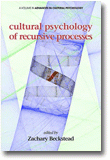
Cultural Psychology of Recursive Processes
Edited by:
Zachary Beckstead, Grand Valley State University
A volume in the series: Advances in Cultural Psychology: Constructing Human Development. Editor(s): Jaan Valsiner, Niels Bohr Professor of Cultural Psychology, Aalborg University.
Published 2015
Cultural Psychology of Recursivity illustrates how recursivity, often neglected in the social sciences, can be an important concept for illuminating meaning-making processes. Recusrivity is a fascinating though abstract concept with a wide array of often incompatible definitions. Rooted in mathematics and linguistics, this book brings recursion and recursive processes to the foreground of psychological processes. One unifying claim among the diverse chapters in this book is that recursion and recursive processes are at the core of complex social and psychological processes. Recursion is bound up with the notion of re-turning, re-examining, re-flecting and circling back, and these processes allow for human beings to simultaneously distance themselves from the here-and-now settings (by imaging the past and future) while being immersed in them. The objective of this book is not simply to celebrate the complexity of human living, but to extend the notion of recursion, recursivity and recursive processes into the realm of social and psychological processes beyond the arenas in which these ideas have currently thrived.
Cultural Psychology of Recursivity shows that in spite of the difficulty in defining recursivity, self-referencing (looping), transformation (generativity), complexity, and holism constitute its core characteristics and provide the basis for which authors in this book explore and elaborate this concept. Still, each contribution has its own unique take on recursivity and how it is applied to their phenomenon of investigation. Chapters in this book examine how recursive processes are related to and basic aspects of play and ritual, imitation, identity exploration, managing stigma, and commemorative practices. This book is intended for psychologists, sociologists, and mathematicians. Use of the book in post-graduate and graduate level of university teaching is expected in seminar format teaching occasions.
CONTENTS
Series Editor’s Preface: From Recursivity to Precursivity: Making Psychology Generative, Jaan Valsiner. Introduction: Entering the Recursive Realm, Zachary Beckstead. Multiple Presences of Recursivity, Adolfo Perinat. Turtles All The Way Down? Recursion and Infinity in the Human Sciences, Lee Rudolph. Theoretical Recursion in Radical Empiricism: The Universal Philosophical Acid, Eric P. Charles. “Imagined Recursivity” and Stigma Management Among American Atheists, Brooke Long, Fritz Yarrison, and Nicholas J. Rowland. Understanding Others without a Word: Articulating the Shared Circuits Model with Semiotic-Cultural Constructivist Psychology, Danilo Silva Guimarães and Andre Mascioli Cravo. Exploring Exploration as a Recursive Process, Meike Watzlawik, Elli Schachter, and Carla Cunha. Saint Ignatius of Loyola’s Spiritual Exercises as a Recursive Experience, Luis Roberto Rivera, Ana Victoria Prados, Sandra Liliana Londoño, and Mauricio José Cortés. Marking the Past for the Future: Roadside Shrines and Recursivity, Zachary Beckstead. General Conclusion: The End is the Beginning: Moving Forward While Looking Backward.
-
Paperback978-1-68123-018-4
Web price: $45.04 (Reg. 52.99)
-
Hardcover978-1-68123-019-1
Web price: $80.74 (Reg. 94.99)
- eBook978-1-68123-020-7

- PSY000000 - PSYCHOLOGY: General
- PSY031000 - PSYCHOLOGY: Social Psychology
- PSY030000 - PSYCHOLOGY: Research & Methodology
-
 Culture, Work and Psychology
Invitations to Dialogue
Culture, Work and Psychology
Invitations to Dialogue
-
 Deep Loyalties
Values in Military Lives
Deep Loyalties
Values in Military Lives
-
 Drama of Multilingualism
Literature Review and Liberation
Drama of Multilingualism
Literature Review and Liberation
-
 From Dream to Action
Imagination and (Im)Possible Futures
From Dream to Action
Imagination and (Im)Possible Futures
-
 Home in Transition
The Cultural Construction of Heimat
Home in Transition
The Cultural Construction of Heimat
-
 Making of Distinctions
Towards a Social Science of Inclusive Oppositions
Making of Distinctions
Towards a Social Science of Inclusive Oppositions
-
 Ornamented Lives
Ornamented Lives

